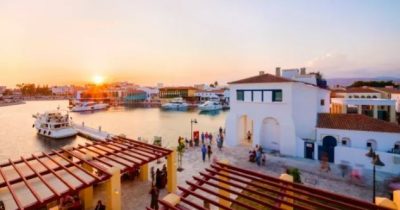

Anyone idly scanning Cyprus property websites dreaming of a home in the sun is likely to notice a strange phenomenon: a surprising number of properties on sale for precisely 2m.
The explanation for this mysterious clustering lies in the burgeoning market in investment-based citizenship programmes for wealthy individuals who make a suitable financial commitment. Cyprus citizenship can be acquired for a property investment of 2m. Immigration lawyers and agents who process such applications say the number of countries offering these schemes is rising, as governments scent a market opportunity, respond to a financial crisis, or, in some cases, both. In 2015, Vanuatu, the tiny South Pacific Ocean nation, introduced its Citizenship by Investment Program to raise money for rebuilding after a cyclone. The market opportunity is certainly becoming stronger. The overall growth in demand has accelerated because of greater instability over the past five or six years, going back to the Arab spring, says MichaRose Emmett, London-based chief executive of CS Global Partners, which helps clients with applications. Events are making people sit up and say: I just want to diversify my life and my familys life for the future because I dont know what will happen to me. If the rich customarily diversify investment portfolios to avoid excessive reliance on the performance of one volatile asset class, why not diversify their lives to avoid dependence on one potentially volatile country? Emmett says local political instability prompts particular spikes in demand, including a recent upsurge from economically troubled South Africa.
As well as the economics, wealthy people are also worried about falling foul of their government at some point in the future. James Perrott, senior counsel in the private client team at Macfarlanes, the City of London law firm, cites the desire for a get out of jail free card as one motivation for a second passport. Although the phrase is taken from the board game Monopoly, he is speaking only semi-metaphorically. The wealthy do, however, have more mundane reasons for wanting second citizenship. Nuri Katz, president of Apex Capital Partners, an international investment advisory firm whose services include investment-based citizenship applications, cites the increasing difficulty in moving assets abroad because of a concerted international crackdown. As a result, people are now looking for jurisdictions that are more tax-friendly, where they can set up tax residency.
This largely explains the appeal of St Kitts and Nevis, home of a long-established programme: it has no personal income tax. Wealthy people also want ease of travel as part of a jet-setting international lifestyle, adds Katz. He gives the example of a wealthy Chinese businessman who wants to go to Paris to sample its haute cuisine without the trouble of having to get a visa. An EU passport, through Cyprus citizenship, provides a solution. The feeling of freedom is very meaningful, says Katz.
Once the wealthy have decided to acquire a second citizenship, which one they choose depends on an individuals circumstance. For the more cost-sensitive, for example, the nation of Dominica in the Caribbean offers citizenship for as little as $100,000. Those worried about their past might have less choice. In 2015, Transparency International, a nongovernmental organisation, deemed it highly likely that substantial amounts of corrupt wealth stolen from China and Russia have been laundered into the UK through Britains Tier 1 (Investor) visa, which offers residency as a route to eventual citizenship. The Caribbean nations, on the other hand, have a reputation for being stricter as they do not want the US to rescind the right of their citizens to visit without a visa. As a more prosaic example of how everyones needs are particular, Katz speaks of a Russian client interested in Grenadian citizenship because Grenada offers visa-free travel to China, a country where he does much business.
Because of the constant vying by countries to make themselves more enticing through visa waivers and other attractions, this industry is very dynamic, says Veronica Cotdemiey, chief executive of Citizenship Invest, an agency based in Dubai and Singapore. Three years ago, St Kitts and Nevis was extremely popular because it was the only Caribbean country with visa-free travel to the EUs Schengen area. In 2015, nearby Dominica offered the same incentive, but kept the costs of acquiring citizenship much cheaper than its rivals. As another example of the industrys dynamism, Perrott of Macfarlanes says there has been a post-Brexit upturn in interest in the UKs Tier 1 programme. In the past, the wealthy often bought the nationality of fellow EU member Malta largely because it allowed them to settle in the UK. Now that it no longer does so, people are considering the more long-winded process of acquiring British citizenship after the requisite five years of residency and £2m of investment. It is, in its own small way, yet another unforeseen consequence of Brexit.